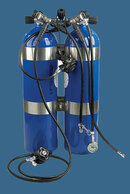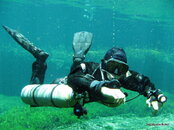I dunno, I've seen some pretty big guys with great air consumption... I remember one guy I asked him if he was inhaling or exhaling, seemed to come back with more gas than he started out with! But that does seemt o be the exception, usually it's the small women who are best.
Is training needed to have two independent twins mounted together?
Well, kinda but pretty minimal. Obviously you have to switch from tank to tank which will involve switching regs, but any certified diver should be able to do that. Then there's some hose management required, and the switching protocol (see below). You might need some guidance to get your trim and weighting set up right too. Not sure what you mean by 'mounted together' if they're manifolded they're not independant, if they're independant they don't have to be together.
Manifolded doubles with a single outlet/single reg would be functionally the same as diving a single tank, so no training required. Manifolded doubles with twinoutlets/regs and/or an isolation manifold required training in valve shutdown procedures and diagnosis.

Do the manifolds need to be on both? I was just thinking using both regs i got one on each bottle. Or is it not enough experience to monitor two gauges? I was thinking i would just use the other when it got to 750 psi... and then begin to surface if the other got to 750
A manifold connects the two tanks together. Independant tanks aren't manifolded. You only need to monitor one SPG at a time. Most people breath the tanks evenly e.g breathe one down by 500 psi, then swtich to the other for 500 psi, switch back etc. This keeps the tanks roughly even which helps with trim and means you have the most gas left should you have a failure on one. They can be back- or side-mounted.
Frankly you don't seem to have a clear idea about twins so I would suggest you find someone who can mentor you if you're going that way, or do a sidemount or twinset course.

I will work on my buoyancy and shallow diving
Correct weighting, good buoyancy/trim and minimal exertion/movement will improve your consumption eventually. Initially you put a lot of effort into those things and your consumption can actually increase. The most important thing IMO is being relaxed and not thinking about it. When you can be relaxed and maintin trim and buoyancy effortlessly, your consumption ahould be at it's lowest






